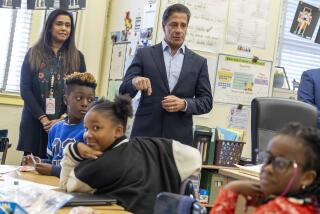The Humble TV Still Serves as an Instructional Medium
The hubbub over the Internet and its potential to transform education overlooks the fact that another key technological innovation in college course work began 30 years ago, and continues today, via the humblest of technologies: the television set.
For decades, the Los Angeles Community College District has offered a tiny smattering of classes via cable television and videos through its Instructional Television unit, or ITV, now based at Los Angeles City College, one of many such distance-learning programs in the state.
This quiet little program is a case study of realistic use of technology--based on what the technology does well.
Video plays the lead role in Instructional TV’s accredited, transferable college-level courses--offering classes that look more like PBS documentaries than lectures. Computers, fax machines and even telephones play occasional supporting roles in posting assignments and promoting class discussions.
Paul McKenna, the district’s distance-education director, has an end in mind: “to take away the access problem” in higher education. The means is clearly less important.
His ideas are working. For years, such an approach was hampered by geographic limits on cable programming and the scant availability of quality educational programs. Four years ago, Instructional TV had just 565 students, he said. Today it enrolls more than 1,800 at any given time.
Although still a tiny program by the standards of the massive community college district, the unit is growing steadily, benefiting from the increased sophistication of nationally distributed educational videos, the evolution of cable services and the advent of the VCR as ubiquitous home equipment.
There are still only a score of Instructional TV course offerings, mostly lower-division core academic courses such as English 102. Math offerings are being considered, but have yet to be approved.
The classes consist of about five three-hour, live seminars and about an hour per week of instructional television programs or rented videos, featuring splashy visuals and faculty from universities all over the country. A discussion of drama for a literature class, for example, includes shots of plays being performed.
The weekend seminars are taught by an instructor at a community college campus. The same instructor is available by phone and e-mail and during regularly scheduled office hours. Exams are taken in person, at various campus locations.
“It’s definitely more convenient,” said Russ Robinson, who has taken anthropology and political science courses via Instructional TV. “But it is hard. If people think it’s going to be an easy credit, forget it.”
Lack of regular contact with a professor is something he missed, he said.
The classes work best for highly motivated students and those who resist the urge to procrastinate, faculty say. “Students that do everything walk away having a very good experience,” said Jeffrey Blum, an L.A. City College psychology professor who has taught the courses.
For questions about Instructional Television, call (800) 917-9277, or visit the offices at Los Angeles City College in Hollywood or the Web site at https://www.lacc.cc.ca.us/itv/itvfrset.htm.
Fax requests to (323) 666-4042, or mail them to Instructional Television, P.O. Box 292200, Los Angeles, CA 90029.
More to Read
Sign up for Essential California
The most important California stories and recommendations in your inbox every morning.
You may occasionally receive promotional content from the Los Angeles Times.










